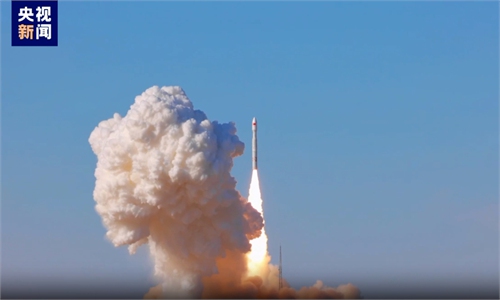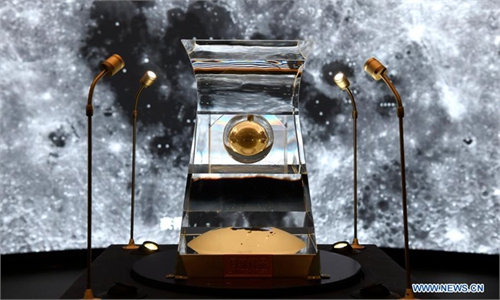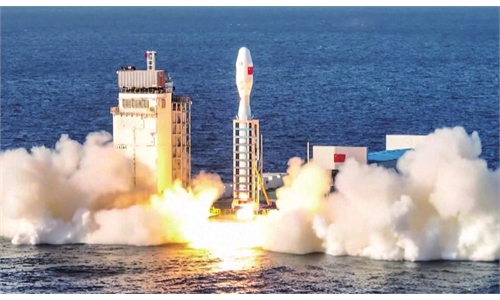Wuhan to host 9th Space Day of China as main venue
Ambitious lunar probe missions, intl cooperation to be unveiled

2024 Space Day of China Photo: Courtesy of China National Space Administration
The China National Space Administration (CNSA) on Wednesday unveiled detailed plans for the upcoming Ninth Space Day of China. The event will fall on April 24 and Wuhan, capital of Central China's Hubei Province will be the main venue.
Jointly organized by the Chinese Ministry of Industry and Information Technology, the CNSA, the Hubei Provincial Government, the Wuhan Municipal Government, and Wuhan University, the main events of this year's Space Day in Wuhan would display to the world the impressive achievements China has accomplished in the last year, while offering clues about exciting future plans in the country's ambitious quest to explore the universe, according to CNSA officials at a press conference in Beijing on Wednesday.
In 2023, China carried out 67 successful orbital launches, setting a new historic record, Lü Bo, a CNSA official said at the press conference.
Reviewing the remarkable year of 2023, Lü highlighted China's space industry achievements by listing how the largest thrust 700-ton liquid rocket engine in Asia had successfully undergone testing and is now in operation; the Shenzhou-16 and Shenzhou-17 manned spaceflight missions were great successes; and the Remote Sensing-40 satellite was successfully launched, which will provide a more comprehensive and precise scientific basis for China's geological exploration, meteorological research, environmental protection, and advancement in other fields.
The application for lunar research samples from the Chang'e-5 mission has been opened to the world, sharing the achievements with the international community; the international version of the National Remote Sensing Data and Application Service Platform has also been released, aiding the construction of the Belt and Road Initiative (BRI) and the promotion of building a global community with a shared future in outer space, he said.
China's space development is set for an even busier 2024, with Chang'e-6 - the first of China's Phase-4 lunar probe missions - being expected to be launched. The mission would be a moon sample retrieval mission targeting the far side of the Earth's natural satellite. Moreover, China Manned Space will see the launches of Shenzhou-18 and -19 crewed spaceflight missions, according to the CNSA official.
China will announce the plans for the Chang'e-7 lunar probe mission and the international payload onboard the spacecraft during this year's Space Day of China activities in Wuhan on April 24, witnessed by relevant officials from Chinese government agencies, scholars, and researchers from the Chinese Academy of Sciences, universities, space firms, as well as guests from more than 50 countries, regions, and international organizations, Lü revealed.
China designated April 24 as the Space Day of China in 2016 to mark the launch of its first satellite "Dongfanghong-1" into space on April 24, 1970. According to statistics obtained by the Global Times from the organizers, a series of nearly 500 space-themed activities will be held by relevant departments, universities, and associations on April 24.
Aerospace academicians, experts and astronauts will visit schools to give science lectures. Relevant aerospace exhibitions and facilities will be opened to the public and students of all levels. Aerospace-themed films and TV programs, as well as science TV programs and series will also be broadcast during the aerospace event period this year.
The Space Day of China has increasingly become a platform for the country to reach out to the world with openness and sincerity, to boost international cooperation in the space domain.
This year's Space Day of China will include the first-ever China-Latin American and Caribbean States Space Cooperation Forum and release the Wuhan Declaration, the Global Times has learned from organizers on Wednesday.
Some 100 delegates from 26 countries in the Latin American and Caribbean region, and eight international organizations are expected to attend the forum hosted by the CNSA, the Hubei Provincial Government, as well as the Chinese Foreign Ministry.
The forum aims to implement the important consensus reached by leaders of China and Latin America, enrich cooperation within the framework of the China-Latin America Forum, and promote the construction of a China-Latin America community of shared future through high-quality aerospace cooperation, according to the CNSA.
The meeting will invite government officials from China, Latin American, and Caribbean countries, as well as representatives from industries, research entities, and the private sector, to discuss building aerospace partnerships and sharing space technology for the benefit of humanity. Together, they will establish a high-end platform for international aerospace cooperation between China and Latin American and Caribbean countries.
The forum will consist of an opening ceremony on April 24 in Wuhan, a main forum, and four sub-forums, focusing on areas such as space infrastructure to support sustainable socio-economic development, deep space exploration, and space science, the innovative development of the aerospace industrial chain, global governance of outer space, and capacity building in outer space.
Wuhan is known for being a crucial hub for China's commercial space industry, and in recent years, the city has become home to the country's first modern rocket industrial base, which possesses the capability of manufacturing, assembly, and testing 20 rockets annually. The city has also built the country's first small-scale satellite manufacturing line, capable of manufacturing more than 240 satellites a year.




